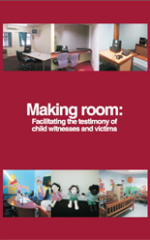Making room: Facilitating the testimony of child witnesses and victims

Making room: Facilitating the testimony of child witnesses and victims
Authors: Commissioned by the Centre for Child Law, University of Pretoria
2015
ISBN: 978-1-92038-34-7
Pages: 70
Print version: Available
Electronic version: Free PDF available
| File Size: | 2.45 MB |
| File Type: | application/pdf |
| Hits: | 13667 Hits |